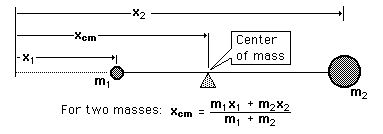Center of Mass
The terms "center of mass" and "center of gravity" are used synonymously in a uniform gravity field to represent the unique point in an object or system which can be used to describe the system's response to external forces and torques. The concept of the center of mass is that of an average of the masses factored by their distances from a reference point. In one plane, that is like the balancing of a seesaw about a pivot point with respect to the torques produced.

| Center of mass for | Collection of point masses | Continuous mass distribution |
| Determining center of mass of extended object |
Torque concepts





